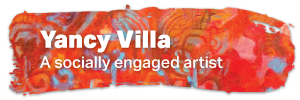Four Freedoms
“Four Freedoms: A new moral order based on the supremacy of human rights everywhere.”
– Franklin D. Roosevelt.
On January 6th, 1941, President Franklin D. Roosevelt addressed Congress in an effort to move the nation away from a foreign policy of neutrality. FDR provided us with a planetary foundation for ethical world leadership. In essence, he made the claim that it is morally and politically unacceptable to ignore global human rights concerns, including the plight of the world's poor.
Roosevelt insisted that PEOPLE IN ALL NATIONS OF THE WORLD shared Americans’ entitlement to four freedoms: freedom of speech and expression, freedom to worship God in his own way, freedom from want and freedom from fear.
Yancy Villa-Calvo in collaboration with Opera Memphis, Latino Memphis, and the Art Museum of the University of Memphis.
This video is one of the performances along with ‘La Posada’ celebration reflecting on the holy family Mary, Joseph, and Jesus immigrating to another country and escaping prosecution.
Art/Race/Violence
A collaborative response
Conceived to commemorate the 100th anniversary of Ell Persons’ very public murder by members of the Memphis community through the act of lynching, the project was further inspired by recent events to memorialize lynching sites in the broader Memphis community in an effort to bring about greater understanding of racial oppression and violence in the South. The artists were challenged to use art to reclaim cultural expression of humankind’s (or “this country’s”) history of racially motivated violence and to examine this history from multiple viewpoints. ***Organized by visual culture historian Dr. Earnestine Jenkins and artist Richard Lou in collaboration with Crosstown Arts.
Perpetrator, Bystander, or Rescuer?
art installation by Lawrence Matthews & Yancy Villa-Calvo
In collaboration with artist Lawrence Matthews, and we created "Perpetrator, Bystander, or Rescuer?" exploring the roles we consciously or unconsciously play in society during times of struggle and invites for audience participation questioning their role in the current political environment that might perpetuate new forms of lynching. (Read More)
